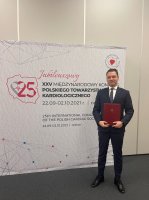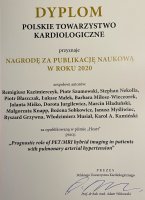The Polish Society of Cardiology awarded Remigiusz Kazimierczyk MD for the publication entitled "Prognostic role of PET / MRI hybrid imaging in patients with pulmonary arterial hypertension", which was published in the prestigious British journal “Heart” (Impact Factor - 5.994).
The awarded publication concerns the usefulness of the modern hybrid PET / MRI imaging in the diagnosis and risk assessment of patients suffering from pulmonary arterial hypertension. Białystok is still one of the few cities in Europe that has access to this unique device that combines magnetic resonance imaging and PET imaging. The advantage of such a hybrid is the fact that during one examination it is possible to obtain images from two technologies at the same time. The combination of both techniques makes it possible to obtain excellent quality images of the heart together with its metabolic changes.
The team hypothesized that metabolic changes in the heart could precede clinical symptoms and that the PET/MRI may provide new parameters that could help detect disease progression early.
The research of the team from the Department of Cardiology was done in cooperation with the Molecular Imaging Laboratory of the Medical University of Bialystok (UMB Bioskaner), where the PET / MRI hardware is located, with the Department of Cardiology in Lublin (where some of the patients included in the study came from) and, above all, with excellent specialists in magnetic resonance of the heart from the Institute of Cardiology in Anin. PET methodology was consulted with an outstanding specialist in this field - professor Stephan Nekolla from the University of Munich.
The paper is the first in the world to confirm the usefulness of the PET / MRI technique in the prognostic evaluation of patients with pulmonary arterial hypertension. The combination of parameters obtained from this hybrid allows to distinguish a subgroup of patients who may have a worse prognosis in the future and therefore may require rapid escalation of treatment and even earlier qualification for lung transplantation. An additional important aspect of the study is the fact that observed metabolic changes occurring in cardiomyocytes may be a starting point for further research into the pathophysiology of the myocardium in pulmonary hypertension.
It is worth noting that the study presents pilot results that require confirmation on a larger group of patients with pulmonary arterial hypertension.
The study confirms that PET / MRI imaging is useful not only in the diagnosis of pulmonary arterial hypertension, but also in the risk assessment of patients' prognosis. Despite the available, established prognostic parameters in this disease, patients in the so-called indirect risk are the biggest challenge. Additional assessment, such as the one presented in this paper, may help to determine whether a given patient requires intensified therapy despite optimal values of standard parameters. The team hopes that in the future, as the (so far expensive) PET / MRI method becomes more available, it will become a widely available method and the source of additional information about the patient.
The full text of the awarded publication
The research published in 2020 is the first in a series of papers considering the use of PET / MRI imaging in the assessment of patients with pulmonary arterial hypertension. The next three studies have been published by the team in prestigious journals such as Journal of Cardiovascular Magnetic Resonance - Impact Factor 5.364; Journal of Clinical Medicine - Impact Factor 4.241 or Advances in Medical Sciences Impact Factor 3.287.
The team is currently conducting a follow-up study and the preliminary results of which received a special "2020 Paul Dudley White International Scholar" award at the 2020 American Heart Association Congress in Dallas, USA.
The project was financed from the funds obtained from the KNOW, statutory grants of the Medical University of Bialystok and from the "Preludium" grant of the National Science Center obtained by Dr. Remigiusz Kazimierczyk in the years 2017-2020.





